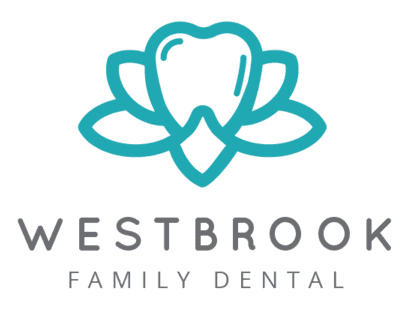Introduction:
No one wants to experience a dental emergency, but sometimes it’s unavoidable. Whether it’s a sudden toothache or a broken tooth, it can be both painful and stressful. Knowing what to do in these situations can help you stay calm and get the help you need. In this blog post, we will discuss some common dental emergencies and provide tips on how to handle them. With the right information and preparation, you can be ready to handle any dental emergency that comes your way.
Toothache
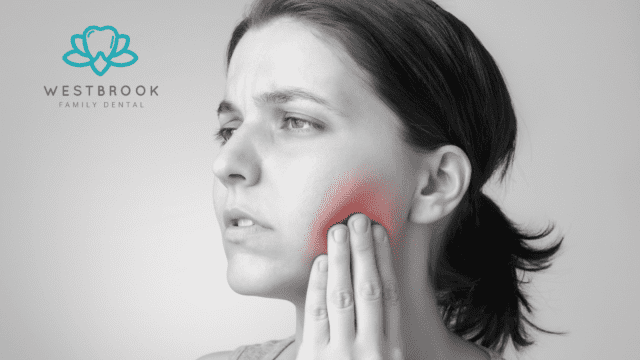
Toothaches are a common problem that can be caused by a variety of things, such as tooth decay, cavities, gum disease, or an infection. All of these can result in a sharp, throbbing pain that can be difficult to endure.
Causes of Toothaches
Toothaches can be caused by a variety of reasons. Some common causes include:
- Tooth decay: Tooth decay is the most common cause of toothaches. When bacteria in your mouth break down the sugars and starches from the food you eat, they produce acids that can damage the outer layer of your teeth (enamel) and create cavities.
- Gum disease: Gum disease, also known as periodontitis or gingivitis, is an infection of the tissues that surround and support your teeth. It can cause inflammation, bleeding, and pain.
- Tooth abscess: A tooth abscess is a pocket of pus that forms in the tooth or in the surrounding tissues due to a bacterial infection. This can cause severe pain, swelling, and fever.
- Tooth fracture or injury: A tooth fracture or injury can occur due to a variety of reasons, including sports injuries, falls, or accidents. This can cause a toothache or tooth sensitivity.
- Bruxism: Bruxism is the habit of grinding or clenching your teeth, which can put pressure on your teeth and cause toothaches or jaw pain.
- Tooth sensitivity: Tooth sensitivity is a common problem that can cause a sharp, shooting pain in your teeth when you eat or drink something hot, cold, or sweet.
- Dental procedures: Certain dental procedures, such as fillings, root canals, or extractions, can cause temporary toothaches or sensitivity.
How to prevent Toothache?
If you’re suffering from a toothache, you know how painful and uncomfortable it can be. But did you know there are simple steps you can take to prevent getting a toothache in the first place? Here’s how to put a stop to those annoying aches and pains before they start.
First and foremost, brush your teeth at least twice a day and floss regularly. Keeping your teeth and gums clean can help you avoid cavities and other issues that can lead to toothache.
Additionally, it’s important to use toothpaste that contains fluoride to help protect your teeth from decay.
Next, visit your dentist regularly for checkups and cleanings. Your dentist can spot any potential issues and help you take action to prevent them from developing into a full-blown toothache.
Finally, pay attention to your diet. Eating a balanced diet that is low in sugar and avoiding acidic foods, such as citrus fruits, can help to keep your teeth healthy and strong.
By following these tips, you can help keep toothaches at bay and enjoy greater dental health. So don’t wait – start taking steps to prevent a toothache today!
Broken or Chipped Tooth
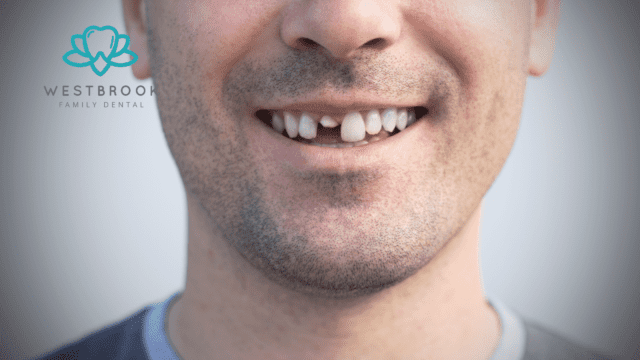
A broken or chipped tooth is a dental condition in which a part of the tooth has been fractured or broken off due to trauma, injury, or decay. This can result in a variety of symptoms, depending on the severity of the chip or break.
Some common symptoms of a broken or chipped tooth include pain or sensitivity when eating or drinking, discomfort when biting or chewing, rough or sharp edges on the tooth, and visible damage to the tooth.
Causes of Broken or Chipped Teeth
- Trauma: Accidents, falls, or blows to the mouth or face can cause teeth to chip, crack, or break.
- Tooth decay: Tooth decay can weaken the structure of teeth, making them more prone to chipping or breaking.
- Teeth grinding: Grinding or clenching your teeth, especially at night while sleeping, can put excessive pressure on your teeth and cause them to chip or break.
- Age: As we age, our teeth become more brittle and may be more likely to chip or break.
- Eating hard foods: Biting into hard foods like ice, hard candy, or nuts can cause teeth to chip or break.
- Poor oral hygiene: Failing to take proper care of your teeth, including brushing and flossing regularly, can lead to tooth decay and weakened teeth.
- Dental fillings: Old or poorly placed dental fillings can weaken the structure of teeth and cause them to chip or break.
- Bite misalignment: An uneven bite or misaligned teeth can put excessive pressure on certain teeth, making them more prone to chipping or breaking.
What to do in case of a Broken or Chipped Tooth?
The last thing you want to experience is a broken or chipped tooth. But when it does happen, it’s important to know what to do to get your smile back to normal.
First and foremost, don’t panic. Even if the tooth is severely damaged, modern dentistry can repair it. The key is getting to the dentist as soon as possible. If you have a broken or chipped tooth, rinse your mouth with warm water and apply a cold compress to help with any swelling. Try to save any pieces of the broken tooth that you can, as they may be able to be used to restore the tooth.
Once you’re at the dentist’s office, they’ll do an exam and X-rays to determine the best course of action. Depending on the severity of the damage, they may be able to repair the tooth with a filling or crown. In more severe cases, they may need to perform a root canal or extraction.
No matter what, the dentist will do their best to restore your tooth to its original shape and size. So don’t worry – with a little help from your dentist, you’ll have a smile you can be proud
Knocked-out Tooth
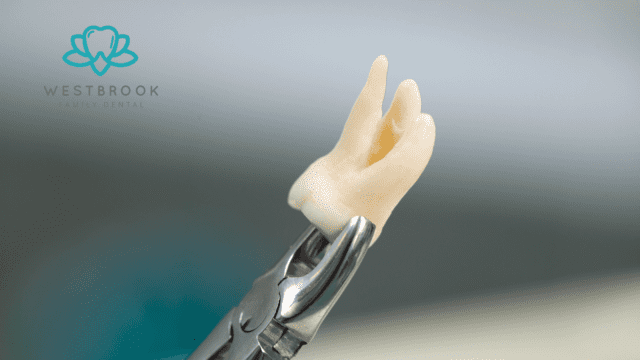
A knocked-out tooth, also known as an avulsed tooth, is a tooth that has been completely displaced from its socket in the jawbone as a result of trauma or injury. The tooth may be partially or completely dislodged, and it is usually accompanied by bleeding and pain.
When a tooth is knocked out, it is important to seek immediate dental treatment, as the chances of saving the tooth decrease rapidly after the first hour. In some cases, the tooth may be able to be replanted and saved if the proper steps are taken promptly.
If you or someone you know has a knocked-out tooth, it is important to keep the tooth moist and handle it carefully to avoid damaging the delicate tissues on the root surface. Rinse the tooth gently with water or saline solution, and try to reposition it in the socket if possible. If you cannot reposition the tooth, place it in a container of milk, saline solution, or saliva to keep it moist, and seek emergency dental treatment as soon as possible.
How to care for a knocked-out tooth before seeing a dentist
- Handle the tooth carefully: When handling the tooth, be careful not to touch the root or any tissue still attached to it. Only hold the tooth by the crown (the white part that is normally visible in the mouth).
- Rinse the tooth gently: If the tooth is dirty, rinse it gently under clean, cool water for no more than 10 seconds. Do not use soap or any other cleaning agent, and do not scrub the tooth.
- Try to reinsert the tooth: If possible, try to place the tooth back in the socket immediately. Gently push it into the socket with your fingers, or bite down on it if necessary. This will help to keep the tooth moist and increase the chances of it surviving.
- Keep the tooth moist: If you can’t reinsert the tooth, place it in a container of milk, saliva, or a saline solution (available at pharmacies). This will help to keep the tooth moist and preserve it until you can see a dentist.
- Manage any bleeding: If the area is bleeding, apply gentle pressure with a clean cloth or gauze for a few minutes until the bleeding stops.
- Take pain relievers: If you are experiencing pain, you can take over-the-counter pain relievers such as ibuprofen or acetaminophen, following the recommended dosage.
Remember, time is of the essence when it comes to saving a knocked-out tooth. So, it’s important to see a dentist as soon as possible, ideally within 30 minutes to an hour of the injury.
What to do in case of a Knocked-out Tooth?
A knocked-out tooth can be a traumatic experience, especially if it happens suddenly and without warning. But don’t panic—there are a few steps you can take to minimize the damage and potentially save the tooth.
Here’s what to do in case of a knocked-out tooth:
- Retrieve the tooth. If possible, try to pick up the tooth by the crown (the part that sits above the gum line) and not the root.
- Rinse the tooth. Gently rinse the tooth with lukewarm water to remove dirt and debris. Do not scrub the tooth or use any type of cleaning solution.
- Try to reinsert the tooth. If the tooth was knocked out due to an accident, try to place it back in the socket. Bite down gently to hold it in place.
- Store the tooth. If you can’t reinsert the tooth, store it in a container of milk or saliva. This will help keep the tooth alive and increase the chances of successful replanting.
- Get to the dentist. Time is of the essence when it comes to saving a knocked-out tooth. If you can, go to the dentist immediately.
Broken Dental Filling or Crown
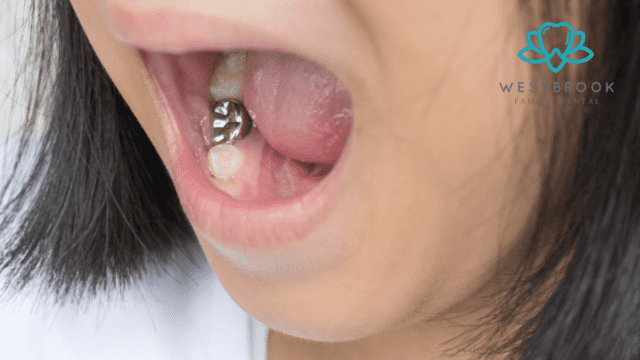
A broken dental filling or crown is a common dental problem where a filling or crown in a tooth becomes damaged, cracked, or broken. A filling is a material used to fill a cavity or hole in a tooth, while a crown is a cap that covers the entire tooth.
When a filling or crown is broken, it can cause discomfort, pain, sensitivity, and difficulty eating. In some cases, it may even expose the tooth to bacteria and lead to an infection. It is important to see a dentist as soon as possible if you have a broken filling or crown.
There are several possible causes of broken dental fillings or crowns, including:
- Decay: When the tooth decay continues to spread, it can weaken the filling or crown and cause it to break.
- Wear and Tear: Over time, constant pressure from biting and chewing can cause the filling or crown to crack or break.
- Trauma: A blow to the face, a fall, or other types of trauma can damage a filling or crown.
- Improper Placement: If the filling or crown was not properly placed or bonded, it may eventually come loose or break.
- Grinding or Clenching: Habitual grinding or clenching of teeth can place excessive pressure on the filling or crown, causing it to crack or break.
- Age of the Filling or Crown: Dental fillings and crowns have a limited lifespan, and they may eventually wear out or become damaged over time.
- Changes in Oral Health: Changes in oral health, such as tooth decay or gum disease, can weaken the tooth structure and make it more susceptible to damage.
What to do in case of a Broken Dental Filling or Crown?
If you find yourself in the unfortunate position of having a broken dental filling or crown, don’t panic – you have options.
Here’s what you need to do in case of a broken dental filling or crown:
- Contact your dentist immediately. The sooner the problem is addressed, the better. Your dentist can assess the situation and determine the best course of action.
- Understand the potential consequences of waiting. Delaying treatment can lead to increased pain, infection, and further damage to the tooth.
- Ask your dentist about repair options. Depending on the extent of the damage, your dentist may be able to repair the filling or crown with a new one.
- Consider a more permanent solution. If the damage is more substantial, your dentist may recommend a more permanent solution, such as a dental implant, bridge or crown.
- Follow all aftercare instructions. After the procedure is complete, it’s important to follow all aftercare instructions to ensure a successful outcome.
Having a broken dental filling or crown can be a scary experience, but it’s important to remember that you have options. By contacting your dentist as soon as possible and following all aftercare instructions, you can ensure that your smile is restored
Broken Jaw
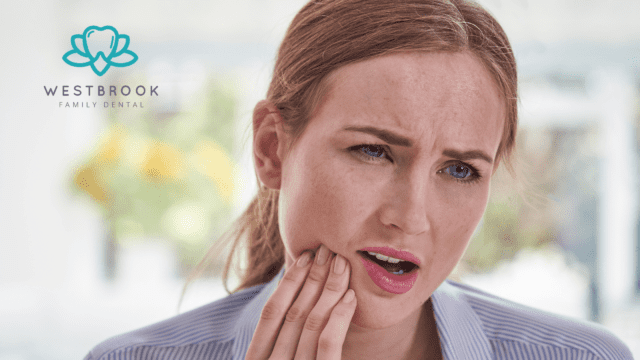
A broken jaw, also known as a mandibular fracture, is a dental emergency that occurs when one or both of the bones in the lower jaw are fractured or dislocated. The jaw bone is a very important structure that is responsible for supporting the teeth and allowing us to chew and speak properly. A broken jaw can cause significant pain, swelling, and difficulty with eating and speaking.
Broken jaws can be caused by a variety of reasons, including trauma to the face, sports injuries, falls, car accidents, and physical altercations. The severity of a broken jaw can vary depending on the location and extent of the fracture or dislocation.
Symptoms of a broken jaw may include:
- Pain and tenderness in the jaw
- Swelling and bruising around the jaw and face
- Difficulty opening the mouth or moving the jaw
- Numbness or tingling in the face or mouth
- Misaligned teeth or bite
- Bleeding from the mouth
What to do in case of a Broken Jaw?
If you have suffered a broken jaw, it can be a scary and stressful time. The injury can cause a significant amount of pain and discomfort, and can even leave you unable to eat or speak normally. Fortunately, there are a number of steps you can take to ensure that your broken jaw is treated properly and that you make a full recovery.
First and foremost, it is important to seek medical attention as soon as possible. When you visit the doctor, they will be able to properly diagnose your injury and provide treatment options. This may include the use of a mandibular splint or some other type of device to keep your jaw in place while it heals. Depending on the severity of the break, you may also need to undergo surgery.
In addition to seeking medical attention, there are a few things you can do at home to help your jaw heal faster. This includes eating soft foods and avoiding any type of hard food, such as nuts or hard candy, that could cause further damage. You should also avoid talking too much, as this could put unnecessary strain on your jaw.
Finally, it is important to take care of yourself while you are healing from your broken jaw. This means getting plenty of rest and limiting your physical activity.
Importance of Regular Dental Checkups
Regular dental checkups are important for maintaining good oral health and preventing dental problems. Dental checkups help detect and prevent oral health issues before they become serious and costly to treat. Here are some reasons why regular dental checkups are important:

- Prevent cavities and tooth decay: Regular dental checkups help to identify early signs of cavities and tooth decay, which can be treated before they become more serious and require treatment that is more extensive.
- Prevent gum disease: Gum disease is a common oral health issue that can lead to tooth loss if left untreated. Regular dental checkups help to detect gum disease early, allowing for timely treatment.
- Early detection of oral cancer: Oral cancer can be a serious and life-threatening condition. Regular dental checkups include an oral cancer screening, which can help detect the disease early when it is most treatable.
- Maintain good oral hygiene: Regular dental checkups allow your dentist to clean your teeth and remove plaque and tartar buildup, which can prevent gum disease and tooth decay.
- Save money: Early detection and treatment of dental problems can save you money in the end. Dental procedures are often expensive, and regular checkups can help prevent the need for costly treatments.
- Improve overall health: Good oral health is linked to overall health. Regular dental checkups can help prevent oral infections and inflammation that can lead to more serious health conditions.
Conclusion:
Dental emergencies can be scary, but being prepared can make all the difference. By following the tips outlined in this blog post, you’ll be better equipped to handle common dental emergencies and get the help you need. Remember, if you’re ever in doubt, it’s always best to seek professional dental care as soon as possible.
If you are seeking a Dental service near Toowoomba, Visit Westbrook Family Dental. Every time you visit our clinic, our skilled and professional dental team will be committed to creating a comfortable, stress-free, and enjoyable dental experience.
Hurry up, get your appointment scheduled for Dental Emergency Treatment at Westbrook Family Dental.!
